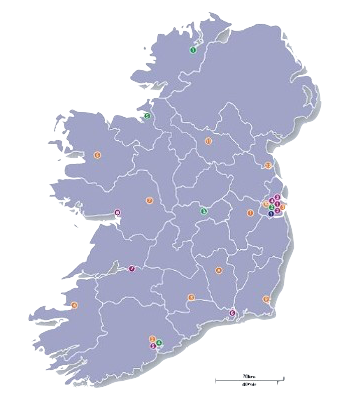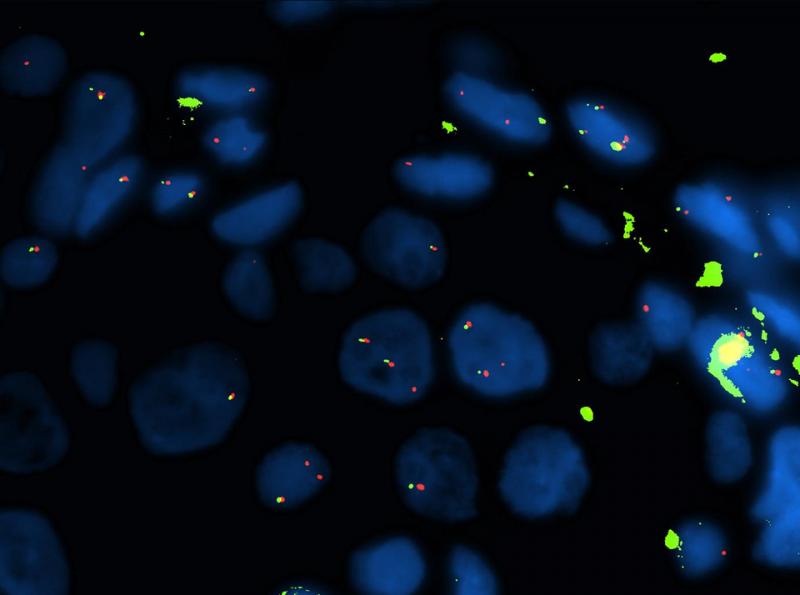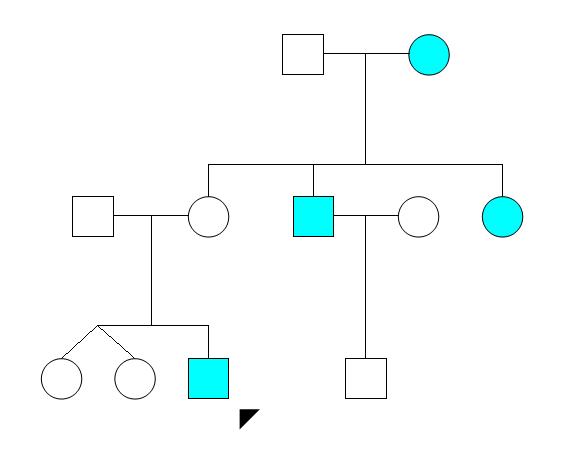Clinical scientists deliver a molecular profiling service to support cancer diagnosis and treatment.
Cancer is recognised as a genetic disease. That means that cancer is caused by mutations in our DNA that cause cancer cells to grow outside of the control of the body's normal SYSTEMS and develop into complicated diseases. Our ability to characterise the mutations that give rise to cancer mean that certain cancers might be better diagnosed using DNA based tests. By using this 'molecular' testing it is also possible to characterise individuals with an increased risk of familial cancer syndromes or to predict which treatment will work best for a particular cancer.
The cancer service in Ireland is orchestrated by the National Cancer Control Programme and delivered by a range of medical, nursing, allied health and support staff. Clinical scientists contribute to this care pathway by providing a service to characterise mutations that drive cancer to aid in diagnosis and treatment. The results provided by these groups of clinical scientists can be vital in determining a patient's treatment. The clinical scientists listed in the following services provide a molecular profiling serive for the main cancer centres (red dots in the map shown) as well as the cancer clinics that support local patient care.


Cancer Molecular Diagnostics
The Cancer Molecular Diagnostics (CMD) laboratory is located in St James's Hospital and has been in operation since 2001. It was formally opened by the then Minister for Health in 2003. The CMD laboratory was initially established to support the diagnosis and treatment of blood cancers and to support the bone marrow transplant service which is delivered by the haematology service in St James's Hospital. From 2011 the CMD laboratory has also provided a solid tumour testing service to assist in the molecular profiling of a number of cancers such as lung cancer, colon cancer and melanoma. The clinical scientists in CMD deliver testing and advice on a number of molecular tests and also act to support improvements in cancer care by contributing to best practice initiatives and clinical and laboratory research.
Cytogenetics
While the CMD laboratory is mainly concerned with identifying very small DNA changes that drive cancer, the cytogentics service characterises chromosomal level defects. Chromosomes contain thousands of individual genes and can be characterised using special microscopic techniques. The cancer cytogenetics service is delivered by the Department of Clinical Genetics, Our Lady's Children's Hospital Crumlin. The molecular testing delivered by CMD is often half of the complete molecular picture required to characterise a particular cancer. The combination of mutation and cytogenetic analysis is required to fully characterise a number of blood cancers and a subset of solid tumours. As with the CMD service the molecular changes identified by the cytogenetics service can be used to aid diagnosis or optimise treatment for cancer patients.


Medical Genetics
Cancer is recognised as a genetic disease. That means that cancer is caused by mutations in our DNA that cause cancer cells to grow outside of the control of the body's normal systems and develop into complicated diseases. Our ability to characterise the mutations that give rise to cancer mean that certain cancer might be better diagnosed using DNA based tests. By using this 'molecular' testing it is also possible to characterise individuals with an increased risk of familial cancer syndromes or to predict which treatment will work best for a particular cancer.
Cancer Research
St James’s Hospital is a centre of excellence in cancer care has over 20 years of expertise in improving the clinical outcome of patients with lung cancer. The Thoracic Oncology Research Group is housed within the Trinity Translational Medicine Institute on the St James’s Hospital campus and has been at the forefront of lung cancer research on an international and national level. The group consists of a multidisciplinary team of Medical Oncologists, Surgeons, Pathologists, Clinical Research Nurses and Clinical Scientists. Clinical Scientists within the research group have a specialist interest in the study of lung cancers such as non-small cell lung cancer (NSCLC), small cell lung cancer (SCLC) and the asbestos-related cancer, mesothelioma. Complementing the lung cancer service at St James’s Hospital, Clinical Scientists support ongoing clinical trials within the Oncology Department. They are actively involved in scientific and clinical research studying the fundamental mechanisms that give rise to lung cancer, and in understanding why some patient’s tumours become resistant to cancer therapies. This research is essential in order to significantly improve the diagnosis and treatment of all lung cancer patients. Laboratory-based studies identifying new drug targets and the molecular profiling of changes in the DNA of lung tumour cells can then be translated into research-driven personalized treatments for lung cancer patients. These studies have permitted better treatment responses and improved quality of life and overall survival in lung cancer patients in Ireland. An additional role of Clinical Scientists within the lung cancer research group is the training of undergraduate, postgraduate and medical students to enhance both research skills and their understanding of molecular diagnostics.
